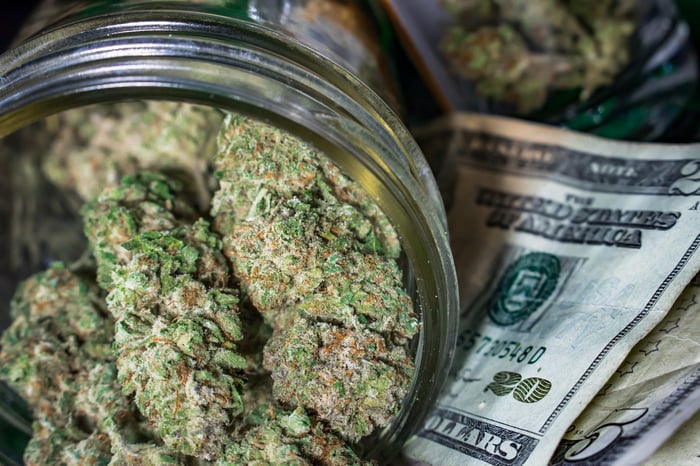When it comes to the fastest growing industries, chances are you're liable to find marijuana at or near the very stop. Last year, according to cannabis research firm ArcView, the North American legal weed market grew sales by 34% to $6.9 billion, and the expectation is that sales could grow by a compounded rate of 26% per year through 2021, creating a market worth nearly $22 billion. This growth has been a big reason investors have sent valuations for marijuana stocks through the roof.
At the heart of this surge in sales has been the belief among the public that marijuana should be legalized. A Quinnipiac University poll in April of this year found that an overwhelming 94% of Americans would like to see medical cannabis legalized, while a Gallup poll released last week showed an all-time record 64% of Americans are in favor of legalizing adult-use weed. Mind you, support for the full legalization of marijuana stood at just 25% back in 1995, so the industry has come an incredibly long way in a short amount of time.

Image source: Getty Images.
Worries persist over marijuana's rapid expansion
While this growth surge has many investors excited about the prospects of legal marijuana, it has a few organizations concerned. For starters, some lawmakers in the U.S. are very worried about what might happen if the industry continues to expand. Gov. Phil Scott (R-Vt.) earlier this year vetoed a bill that overwhelmingly passed in Vermont's state legislature which would have legalized recreational cannabis on the grounds that driving under the influence laws weren't strong enough to deal with potential marijuana offenses.
Additionally, Attorney General Jeff Sessions has dug in his heels with regard to marijuana's expansion. Sessions has regularly opined that no good can come of marijuana being sold legally, and he's often questioned the medical benefits of pot. In fact, Sessions in May sent letters to some of his fellow lawmakers on Capitol Hill requesting the repeal of the Rohrabacher-Farr Amendment, which is what protects medical marijuana businesses from federal prosecution in states that have chosen to legalize.
The expansion of the weed industry has also caused an unwanted buzz among the alcohol industry, which could see its sales growth cut as a result of consumers choosing cannabis over a stiff drink. A 110-page report released last year by Cowen & Co. noted a distinct rise in the number of drinkers who are using cannabis, along with a corresponding decline in the number of cannabis users who happen to drink alcohol. Cowen & Co. suggested that once black market sales begin transitioning into legal channels, alcohol industry sales could suffer.
But not every company in the alcohol industry is fighting this trend.

Image source: Getty Images.
If you can't beat 'em, join 'em
Earlier this week, Constellation Brands (STZ 0.78%), the third-largest beer company in the U.S. with brands like Corona, Modelo, and Pacifico, and a global spirits giant with a large portfolio of wines, beers, and hard liquors, announced a $190 million investment (9.9% stake) in the largest cannabis grower in Canada, Canopy Growth Corp. (CGC 1.28%).
Why Canopy Growth Corp.? According to Constellation Brands' press release, the company is trying to keep up with "evolving consumer trends and market dynamics, while maintaining focus on its core total beverage alcohol business." In other words, cannabis sales are growing at an exceptional pace, and this seems like a logical vice for the spirits giant to consider.
While Constellation Brands notes no desire to sell cannabis or cannabis-related products in the U.S. unless it were legally permissible to do so, there are numerous other reasons Canopy Growth could continue to grow by a triple-digit percentage.
For starters, Canada appears to be on the verge of legalizing recreational cannabis by July 1, 2018. The bill, introduced by Prime Minister Justin Trudeau, has faced roadblocks in parliament, but not enough to derail Canada from possibly becoming the first developed nation to legalize adult-use weed. As the company with the highest growth capacity for the time being, Canopy Growth is in a unique position to benefit.
Canopy Growth is also one of the very few marijuana producers that's been given the green light to export its dried cannabis to overseas markets where medical cannabis is legal. A good example is Germany, which legalized medical cannabis recently but has virtually no domestic pot production. Exports to Germany help supplement already strong demand for dried cannabis.
It also doesn't hurt that Canopy has the highest market share of any marijuana producer, which helps with its pricing power. This could very well turn out to be a positive for Constellation Brands.

Image source: Getty Images.
The future for domestic marijuana stocks is still bleak
Though Canadian marijuana stocks appear to be leaning in the right direction with regard to legalization, domestic pot companies in the U.S. are still facing an uphill battle. In addition to Sessions digging in his heels, there's simply no room on the Congressional docket to consider rescheduling marijuana with tax reform, healthcare reform, and a possible long-term infrastructure package on the table.
What's more, as long as marijuana remains a schedule I substance (meaning it has no recognized benefits and is entirely illegal), U.S.-based businesses operating in the weed industry could face insurmountable obstacles. This includes an inability to take normal corporate income-tax deductions since they're selling a federally illegal substance, as well as having little or no access to basic banking services.
For the time being, growth in the global weed industry won't necessarily translate into a positive for marijuana stock investors.





